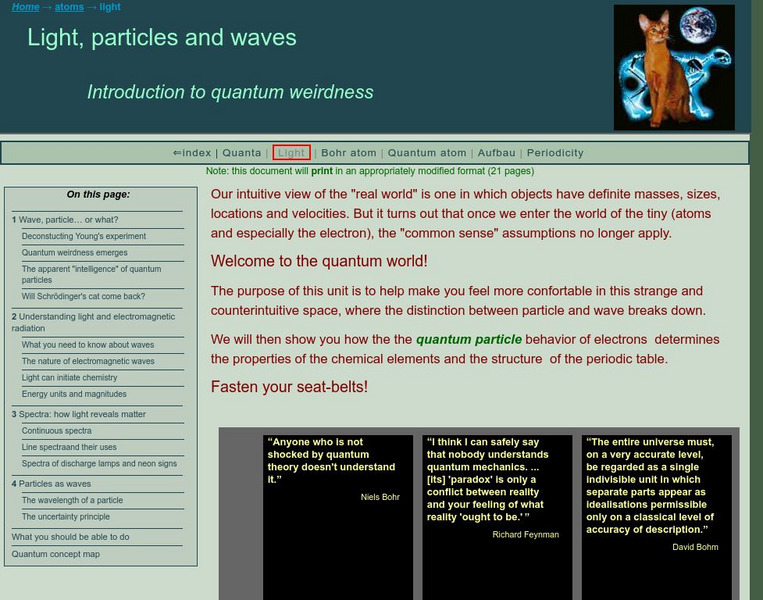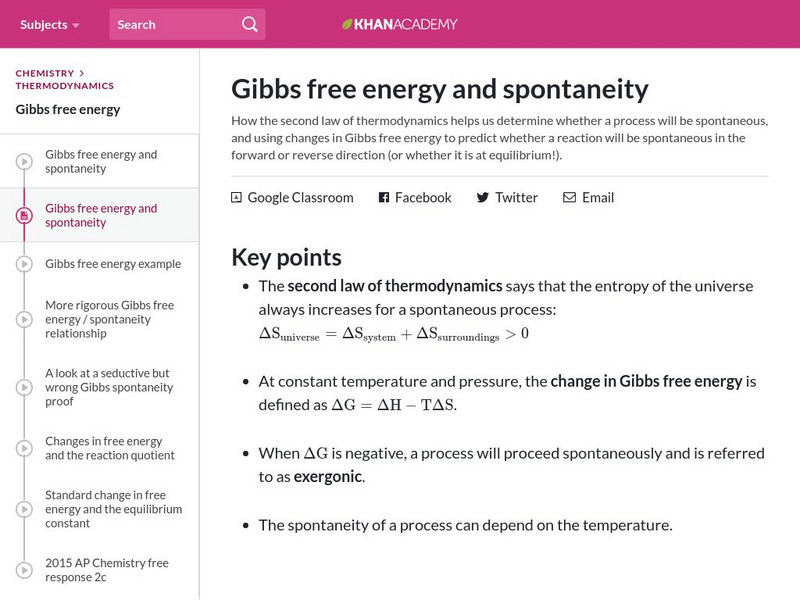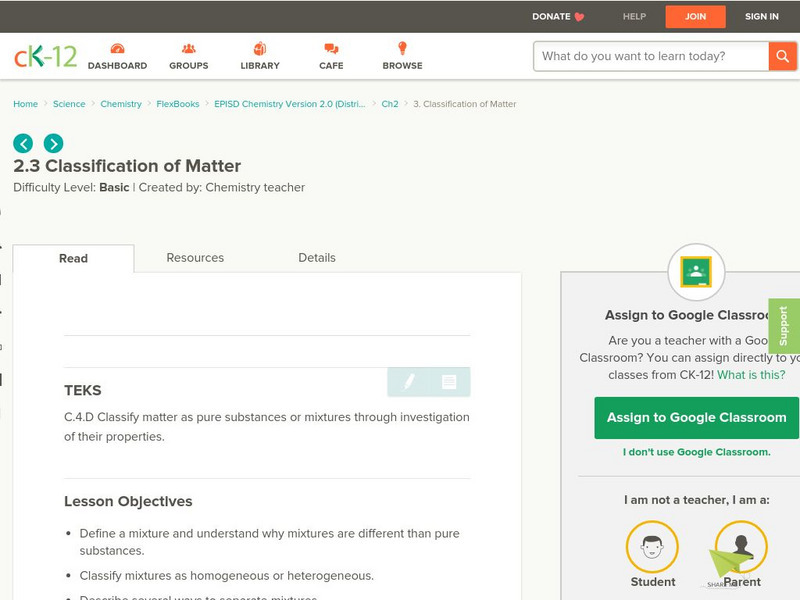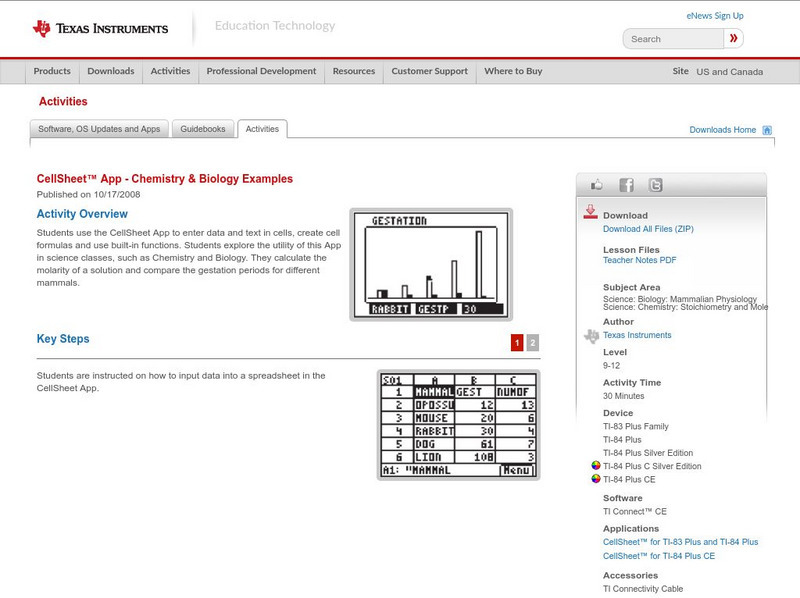Simon Fraser University
Chem1 Virtual Textbook: The Ideal Gas Equation of State
The General Chemistry Virtual Textbook, or Chem 1, is broken into several sections covering various aspects of topics related to chemistry. This section deals specifically with the ideal gas law. To help with the topic, formulas, charts,...
Simon Fraser University
Chem1 Virtual Textbook: Derivation of the Ideal Gas Equation of State
The General Chemistry Virtual Textbook, or Chem 1, is broken into several sections covering various aspects of topics related to chemistry. This section deals with the ideal gas equation and provides a series of formulas related to the...
Simon Fraser University
Chem1 Virtual Textbook: Bohr's Model
Acting as a subtopic of the General Chemistry Virtual Textbook's section on Atoms and the Periodic Table, this site discusses Niels Bohr and his work with the atom. This part of the discussion, focusing on the model itself, brings up...
Simon Fraser University
Chem1 Virtual Textbook: Neutralization
Acting as an overview from the General Chemistry Virtual Textbook, this site explores neutralization in relation to acids and bases. Formulas and examples are also provided.
Simon Fraser University
Chem1 Virtual Textbook: Bases
Acting as an overview from the General Chemistry Virtual Textbook, this site explores bases and their related characteristics. Several formulas are also provided.
Simon Fraser University
Chem1 Virtual Textbook: Light and Electromagnetic Radiation
In discussing the findings of James Clerk Maxwell and Michael Faraday, this site reveals information and formulas related to electromagnetic radiation and the electromagnetic spectrum.
Sophia Learning
Sophia: Converting From Mass to Particles Using a Balanced Chemical Equation
A narrated screencast explaining how to use a balanced chemical equation to determine the number of particles of a substance given the starting mass of another substance. [4:46]
Virginia Tech
Types of Equations
After learning about and reviewing the types of chemical equations and rules for balancing, students can practice balancing equations on interactive quizzes.
CK-12 Foundation
Ck 12: Acids and Bases
[Free Registration/Login may be required to access all resource tools.] In the following online tutorail students will define acids and bases in terms of the ions that are produced when each type of compound is dissolved in water. They...
Khan Academy
Khan Academy: Gibbs Free Energy and Spontaneity
Explanation of Gibbs Free Energy and Spontaneity. Includes formulas and examples.
Other
Fernbank: Review of Ionic Charges
At this site from Fernbank you can become a pro by practicing them with this review game.
Simon Fraser University
Chem1 Virtual Textbook: Effects of Dilution on an Equilibrium
Acting as an overview from the General Chemistry Virtual Textbook, this site explores equilibrium and equilibrium constants in reference to dilution. Formulas and charts are also provided on the subject.
Simon Fraser University
Chem1 Virtual Textbook: What Is a Wave?
Acting as part of an overview on quantum theory, this section of the site answers the question, what is a wave? In addition to a definition, several examples and formulas are provided.
CK-12 Foundation
Ck 12: Molecular Compounds
[Free Registration/Login may be required to access all resource tools.] Students investigate compounds, and learn the ways in which molecules are named.
Other
California State University: Carboxylic Acid Unknown Candidates
Table of names, formulas, and physical data on many orgainc acids.
Khan Academy
Khan Academy: Naming Monatomic Ions and Ionic Compounds
Learn how to name monatomic ions and ionic compounds containing monatomic ions, predict charges for monatomic ions, and understand formulas.
Other
Okanagan University College: Basic Organic Nomenclature
This site from the Okanagan University College has basic descriptions of organic cycloalkanes. Explanations of drawings and examples are provided.
CK-12 Foundation
Ck 12: Lewis Electron Dot Structures
[Free Registration/Login may be required to access all resource tools.] The following online tutorial describes how a covalent bond forms, including the energy change involved in the process.Students will be asked to use the octet rule...
CK-12 Foundation
Ck 12: Classification of Matter
[Free Registration/Login may be required to access all resource tools.] In this online tutorial students will define a mixture and understand why mixtures are different than pure substances. They will classify mixtures as homogeneous or...
Crescent Public Schools
The Internet Science Room: Oxidation Numbers and Chemical Bonding
Through animated diagrams and illustrated examples, students can further their understanding of chemical bonds and oxidation numbers.
CK-12 Foundation
Ck 12: Physical Science: Chemical Equations
[Free Registration/Login may be required to access all resource tools.] An overview of chemical equations.
Texas Instruments
Texas Instruments: Cell Sheet App
Students use the CellSheet App to enter data and text in cells, create cell formulas and use built-in functions. Student explore the utility of this App in science classes, such as Chemistry and Biology. They calculate the molarity of a...
Kent State University
Kent State University: Krebs Cycle
This page contains diagrams and formulas for the Krebs cycle. The page has seven different catagories. The page is written by Clarke Earley, Ph.D., a chemistry professor at Kent State University.
Other
Imperial College: Cf Cs
This site from the Imperial College of Science provides a chemistry based discussion of CFCs with formulas and Molecular structures.




















